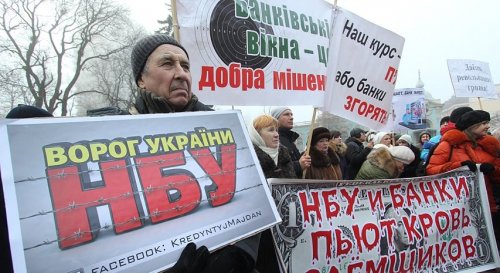Many hoped that a full-fledged civil society would be born in the fire of the Maidan, which would become the basis for the formation of a truly democratic political system and the foundation of a new legal state. However, the mountain gave birth to a mouse. A huge number of non-governmental, non-profit organizations, foundations, societies for the protection of something and from someone are nothing more than simulacra. It has gotten to the point that in some cases, individual representatives of the so-called civil society are challenging the state’s monopoly on violence, placing themselves above it and serving as a source of constant tension in society.
This order of things benefits everyone. The authorities – because thanks to the presence of simulacra, the appearance of the existence of a real civil society is created, which allows one to avoid criticism from Western partners of infringing on rights and freedoms. Push the necessary bills through parliament, relying on supposedly broad support of public opinion.
Politicians – because it makes it possible to channel the energy of the masses to fight their opponents and competitors, resolve property disputes and conflicts.
Finally, the leaders of such organizations, increasingly speaking on behalf of the people, which, by the way, no one authorized them to do, are given a chance to take a place at the trough, satisfy their own ambitions and get the maximum benefit from their position. Few of them are truly aimed at solving pressing issues of everyday life. Often these are simply professional, one might say ideological, fighters for banknotes.
All together they construct a different reality in which, through manipulation, an ordinary citizen is skillfully wiped away from the opportunity to influence decision-making and effectively participate through control over power, both in his own destiny and in the destiny of the state.
The decline in economic growth rates, instability of the exchange rate and a number of other factors that began to appear immediately after the change of power in Kyiv significantly influenced the well-being of citizens towards its deterioration. Protest sentiments began to grow in society. By the beginning of April 2014, due to a sharp jump in the dollar exchange rate, a separate category of dissatisfied citizens began to emerge – foreign currency borrowers. By December, three full-fledged organizations had formed among the protesters, claiming the exclusive right to protect borrowers: “Pravdiva Kraina”, “Credit Maidan”, “Civil Control of Banks” (“Financial Maidan”). Since then, there has been a dynamic increase in protest activity, with widespread media coverage.
When analyzing the statutory documents of these organizations, attention is drawn to points about intentions either to participate in the formation of government bodies, or to exercise control functions by joining certain public councils under various ministries and departments.
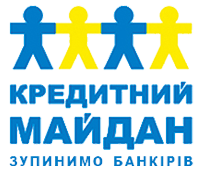 NGO “Credit Maidan” – Tatyana Rudenko, Yulia Salo
NGO “Credit Maidan” – Tatyana Rudenko, Yulia Salo
Thus, the charter documents of the NGO “Credit Maidan” state that it is a non-profit voluntary association of citizens acting in accordance with the Constitution of Ukraine. The goal is to protect the rights of Ukrainian citizens, in particular borrowers, whose rights have been violated. Countering the anti-people banking-state system, which is responsible for the impoverishment of the Ukrainian people. And if everything is clear with the first part (protecting the rights of borrowers), then the second part (countering the anti-people banking-state system responsible for the impoverishment of the Ukrainian people) raises questions.
No one argues that the Ukrainian banking system is going through hard times, but the declared approach is more like a call to “take and divide,” urging citizens towards pogroms rather than constructive creation.
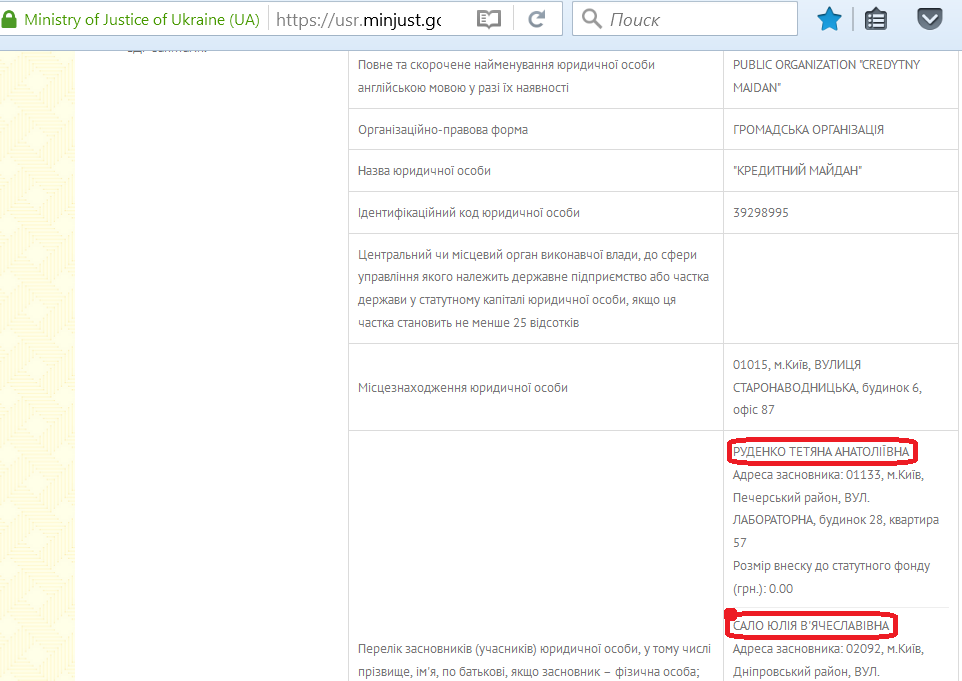
No less interesting are the tasks that this organization sets for itself. “Force the authorities to protect the interests of citizens, who are borrowers, and not to protect bankers,” says the organization’s charter. What to do with one of the main democratic postulates that everyone is equal before the law? Or are borrowers “more equal” than bankers?
The postulated approach contradicts the very principles of democracy, for which the activists and leadership of the “Credit Maidan” intend to fight with such fury. This attitude looks especially dangerous if we consider that among the priority tasks of the organization is participation in the formation of government bodies and representation in them. That is, as you can see, the guys clearly have an imagination that is not limited purely to the protection of borrowers.
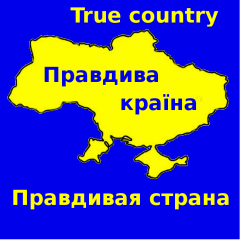 NGO “Pravdiva Kraina” – Yaroslava Avramenko, Tatyana Rudenko, Yulia Salo
NGO “Pravdiva Kraina” – Yaroslava Avramenko, Tatyana Rudenko, Yulia Salo
The NGO “Pravdiva Krajina” has a slightly different style. These self-organized not only to ensure a constructive dialogue between borrowers and creditors and authorities, but also to prevent economic collapse in the country. The goals are cosmic, but the formulated tasks are quite earthly. One of them is the development, together with the NBU, of mechanisms for compensating commercial banks for financial losses from national restructuring! Their slogan could well be the legendary “Nationalize losses, privatize profits!”
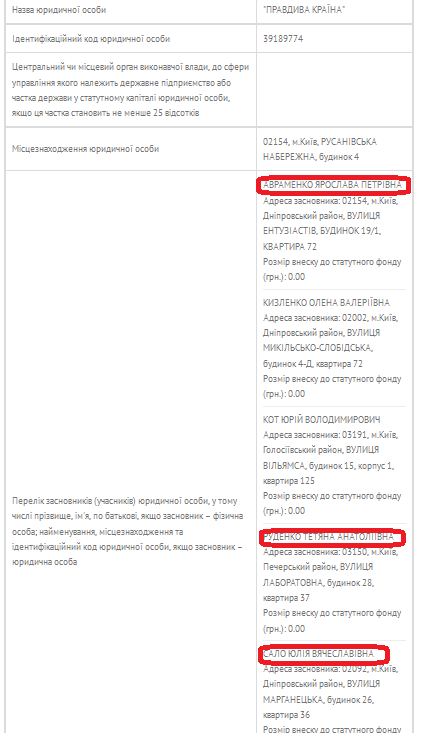
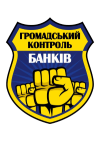 NGO “Civil Control of Banks” (“Financial Maidan”) – Yulia Salo
NGO “Civil Control of Banks” (“Financial Maidan”) – Yulia Salo
The NGO “Civil Control of Banks” or “Financial Maidan” also impresses with the scale of its tasks. Here is the fight for all the good against all the bad, and the solution of problems on a national scale in order to improve the economic situation in the country and much more.
Even a superficial acquaintance with the official documents of organizations gives reason to believe that behind the “good” intentions there may be specific interests, specific individuals, or political forces. It should also be noted that among the founders of these organizations one can find the same names. At the same time, leaders intend to act autonomously, often blaming each other for the discrepancy between real actions and the stated goals of the organizations they lead.
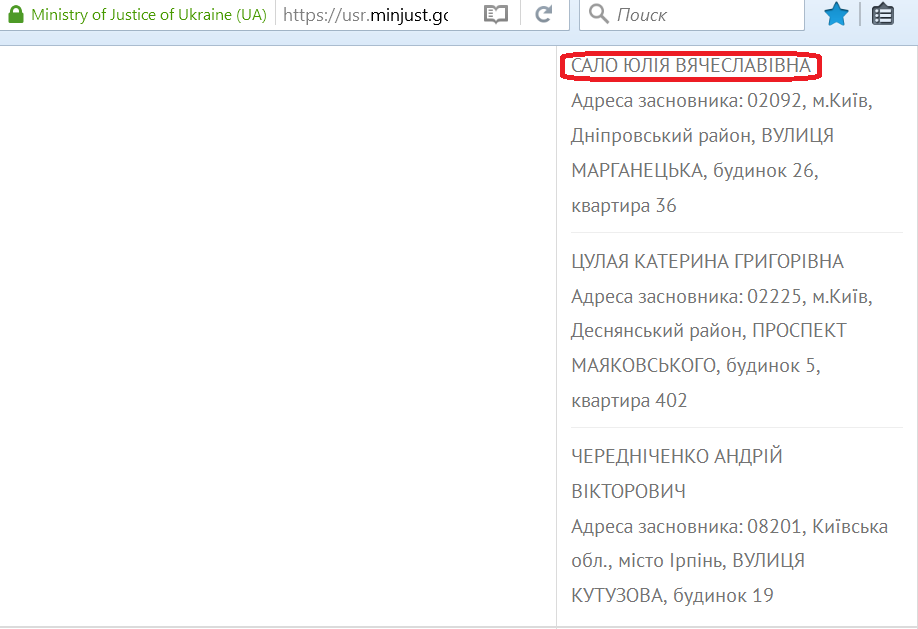
—
Upon closer examination, Tatyana Rudenko, Yaroslava Avramenko and Yulia Salo turned out to be quite colorful characters, so it makes sense to dwell on them in more detail.
NGO “Credit Maidan” – Tatyana Rudenko
“Colleagues” in social activities have a number of complaints against the leader of “Credit Maidan”, including: attempts to convince borrowers to abandon protest actions, non-transparent financing of the organization, discrediting the reputation of the borrowers’ movement, connections with discredited politicians. “For example, we struggle, with a broken door, to get to a meeting of a relevant parliamentary committee, and she is already there. How is this possible?” Yulia Salo was indignant, speaking about Tatyana Rudenko’s connections, while modestly keeping silent about why she herself remains in the leadership of the organization.
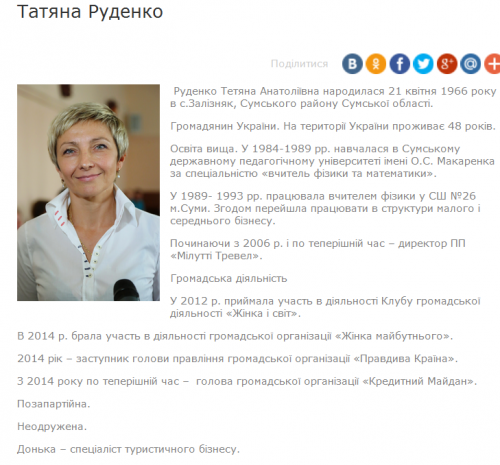
It can be assumed that “access” to high offices, as well as financing of the organization at a certain stage, was provided by Nikolai Rudkovsky, with whom Tatyana Anatolyevna was No. 3 in the Bloc of Left Forces in the 2014 parliamentary elections.
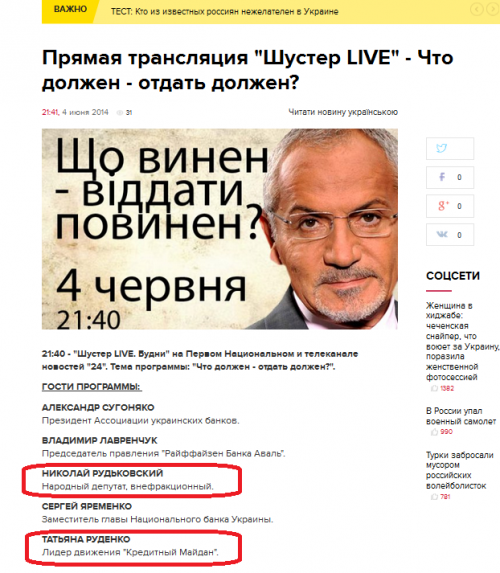
June 4, 2014 Nikolai Rudkovsky and Tatyana Rudenko with Savik Shuster
September 5, 2014 joint press conference of Nikolai Rudkovsky, Tatyana Rudenko and Yulia Salo
However, already in January 2015, which saw another surge in civil activity among borrowers, Tatyana Rudenko found another patron in the person of Oleg Lyashko’s “Radical Party” (Read more about Oleg Lyashko in the articles Combat radical Lyashko), actively promoting the need for the resignation of the head of the NBU, Valeria Gontareva. People’s Deputy from the “Radical Party” Yaroslav Godunok stated in particular: “I do not want to identify myself with the current government. If Themis is blind, then our government has always been deaf. We must open a second front in the fight for our rights. And today I spoke with people’s deputies from the faction of Oleg Lyashko’s Radical Party – a command was given and a memorandum will be signed with the NGO “Credit Maidan” to effectively protect the interests of borrowers. We will protect every person”
NGO “Pravdiva Kraina” – Yaroslava Avramenko
Obviously, Yaroslava Petrovna was forced to concern herself with resolving the issues of borrowers due to her former position as head of the department for working with problem assets at Delta Bank OJSC. In this regard, she was repeatedly accused of lobbying the interests of bankers.
Yulia Salo about Yaroslav Avramenko: “Half of the seats in the public council under the NBU are bankers. This body, in fact, lobbies their interests. And Yaroslava Avramenko, allegedly on behalf of public organizations of investors, claims to support the council’s initiatives. But that’s not true”
Tatyana Rudenko about Yaroslav Avramenko: “All members of public organizations of borrowers do not trust Yaroslav Avramenko. Her “Pravdiva Kraina” throws mud at everyone – both borrowers and activists. From the online forum “Pravdiva Kraina”, the moderator removes all comments from activists who are disloyal to the organization.”
In addition, judging by some posts on social networks, Yaroslava Avramenko is a supporter of factoring, or debt collection from a borrower whose debt was purchased from a bank by a factoring company. Despite the difference between collection and factoring companies, in Ukrainian realities their methods are practically no different. A fair question arises: how, with such “baggage,” can a person heading a public organization for the protection of borrowers’ rights, in principle, defend their rights?
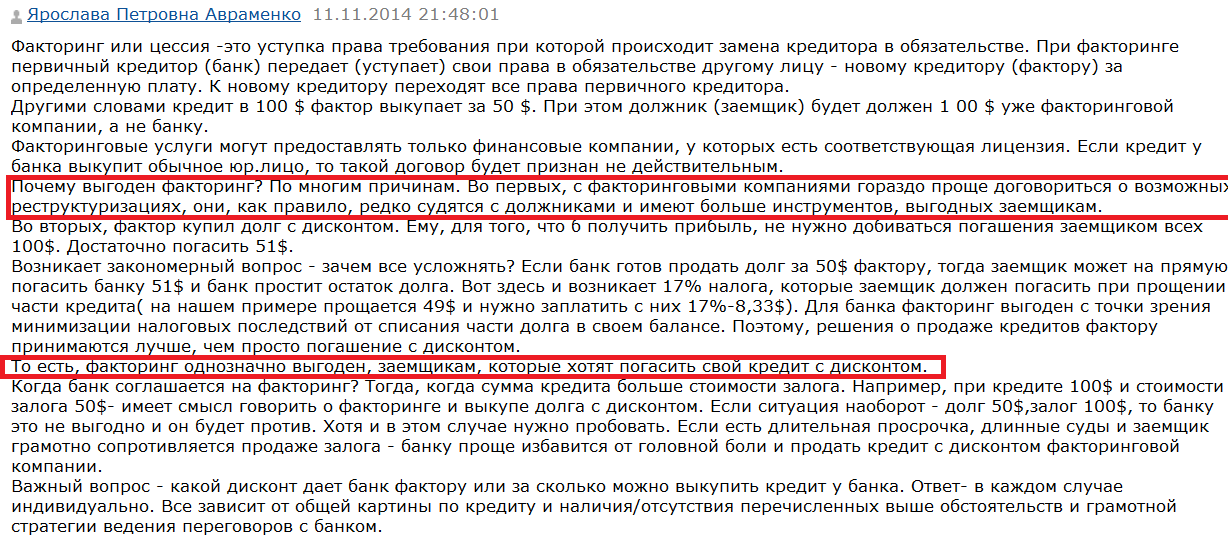
The answer lies on the surface. It’s just that someone needed their own person in the public council under the NBU. Based on existing information, the BPP faction in the Verkhovna Rada needed him, where people’s deputy Ruslan Solvar (Read more about Ruslan Solvar in the article Ruslan Solvar. Families Watching Railroad Freight Transportation Still in Business), whose assistant Yaroslava Petrovna once worked as. If we take into account that the candidacy of the head of the NBU is submitted to parliament for consideration by the president, then it becomes clear why Avramenko was placed in the leadership of the public council – she creates the appearance of coordination of the decisions of the NBU with representatives of civil society, only occasionally biting the head of the Central Bank, so as not to arouse suspicion of her control.
Public organization “Civil Control of Banks” (“Financial Maidan”) – Yulia Salo
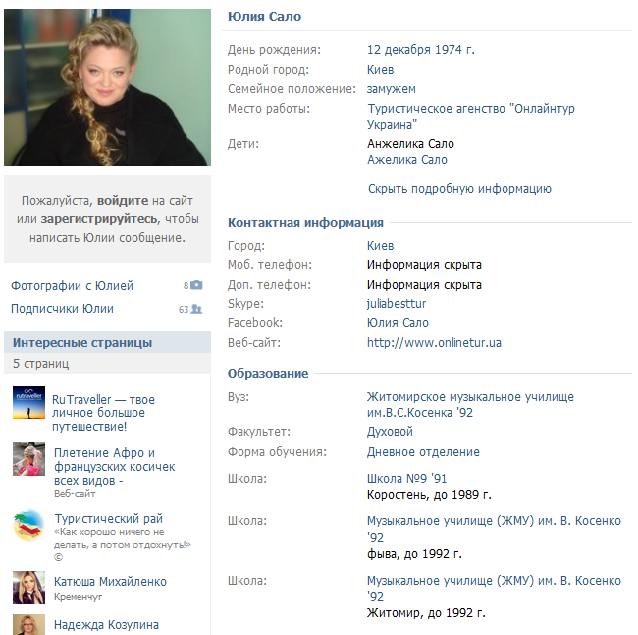
As can be seen from the biography, playing wind instruments in a military orchestra did not appeal to Yulia Salo. Obviously, having felt an entrepreneurial spirit in herself, she opened the travel agency “Onlinetour Ukraine”. However, judging by the reviews, things didn’t work out, and the businesswoman, having become fairly experienced in entrepreneurship, decided to scale new heights that promised truly big profits.
Reviews about the travel agency “Onlinetour Ukraine”
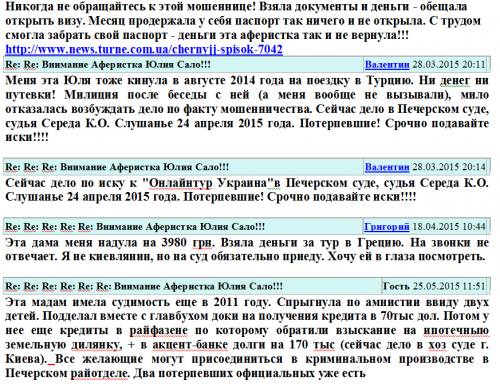

And the revolution provided her with such an opportunity. Fortunately, borrowers turned up who were outraged by the “new course” (both the economy and the dollar), and the music school graduate decided to play on whose righteous anger.
According to media reports, Yulia Salo is associated with the Popular Front and specifically with the deputy of this party Yevgeny Deydey, a former centurion of the 7th hundred of Maidan self-defense, coordinator of the Kyiv-1 battalion. Since the beginning of the protests near the NBU, the tents in which activists of the organization collected signatures were the tents of Yevgeny Deydey.
Perhaps it is Deidei’s connection with the security forces that can explain the aggressiveness demonstrated by the organization’s activists. And if we take into account the fact that the people’s representative is an adviser to the Minister of Internal Affairs, then there is an explanation for the inaction of the police during the forceful actions of the Financial Maidan organization, as happened on March 15 of this year.
According to some experts, it is also beneficial for the “Popular Front” to have a pocket public organization that puts forward inflated demands, which, if voted for, will lead to the collapse of the financial system, and if vetoed, they will put both the BPP and the president personally in an unfavorable light, adding points to the bank. Popular Front”.
The scary thing about all this is that almost all ministries are filled with such representatives of “civil society”. What kind of democracy and reforms can we talk about in this case?
Kasym Jumasov, for SKELET-info

